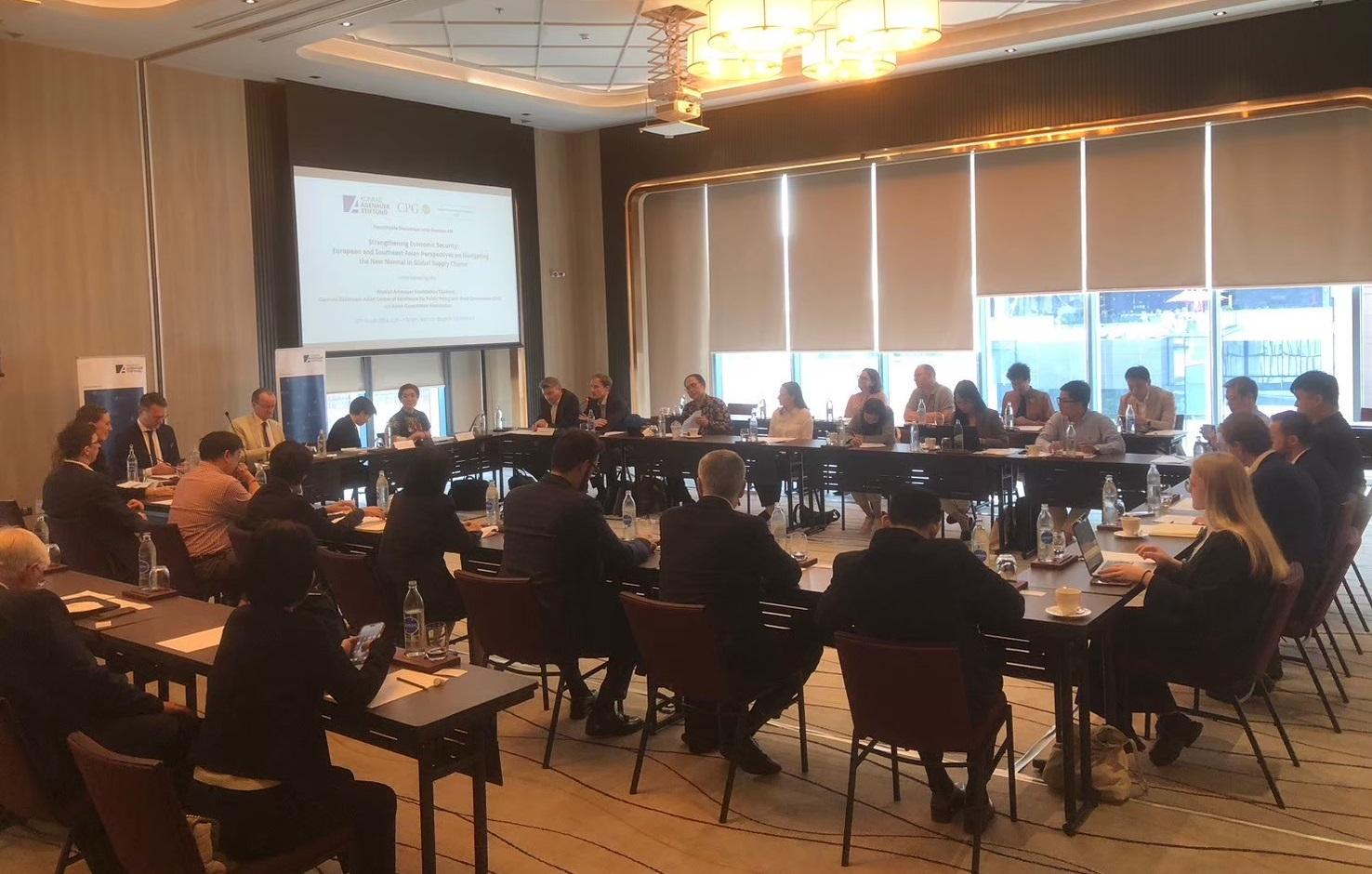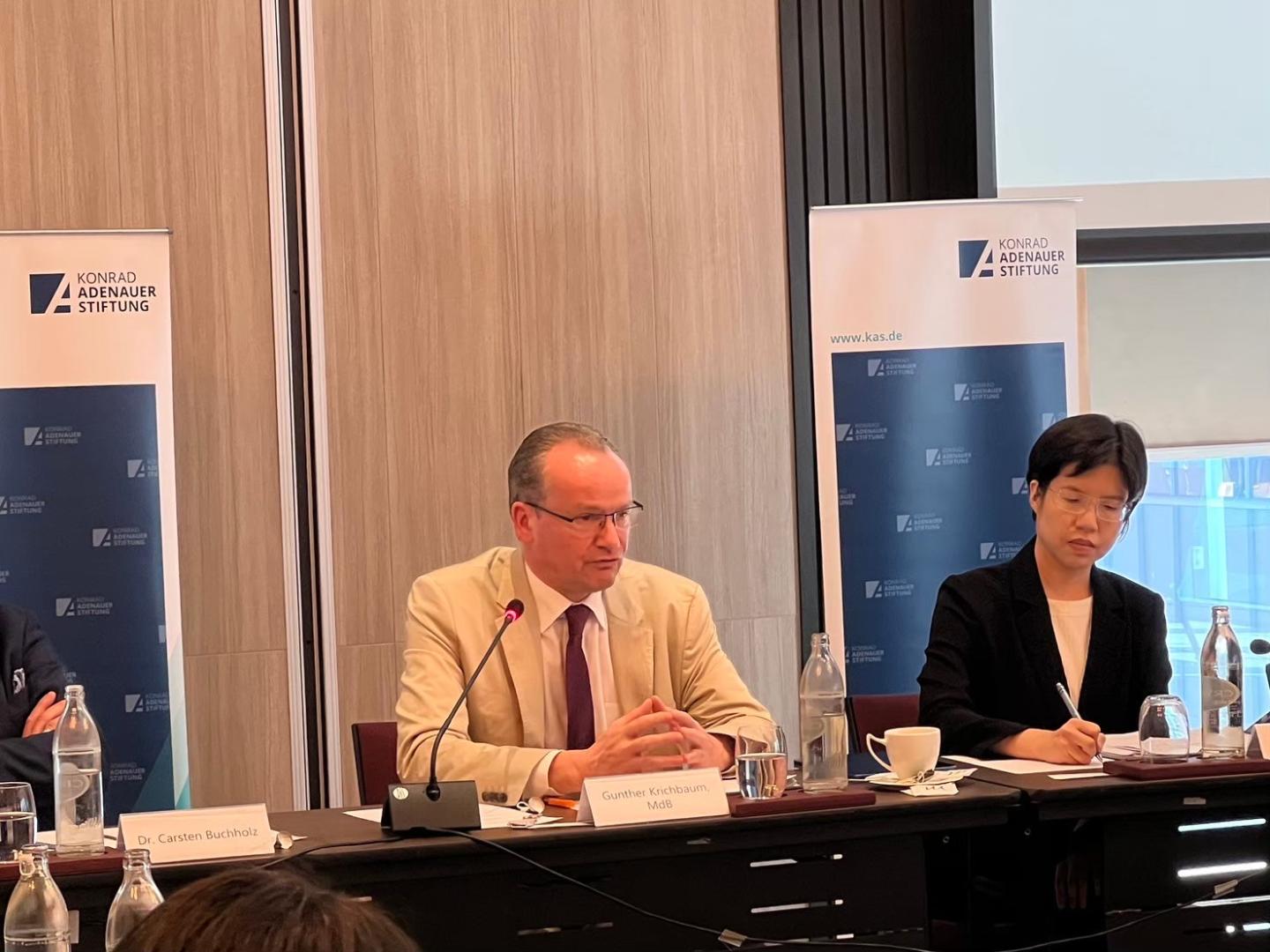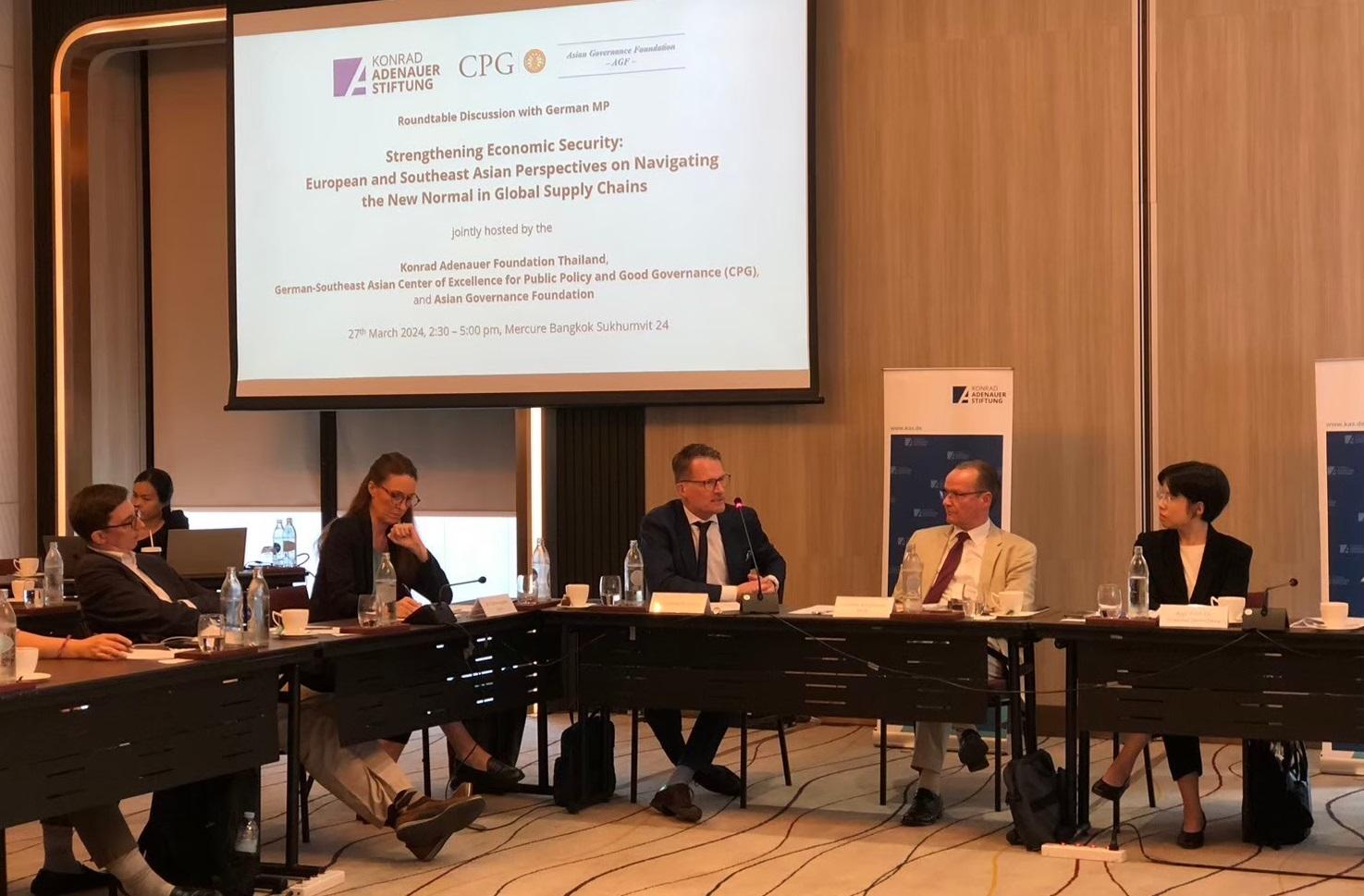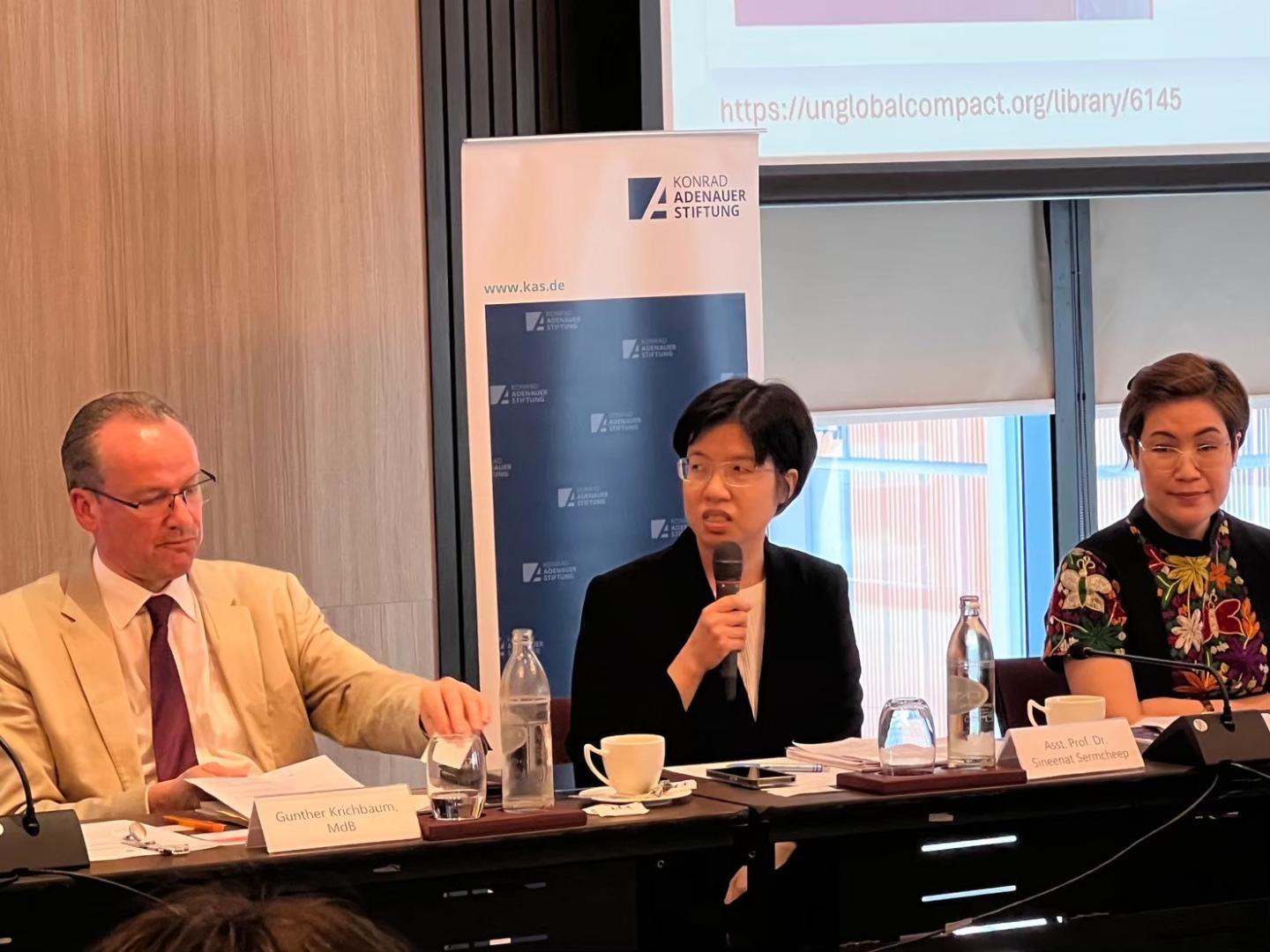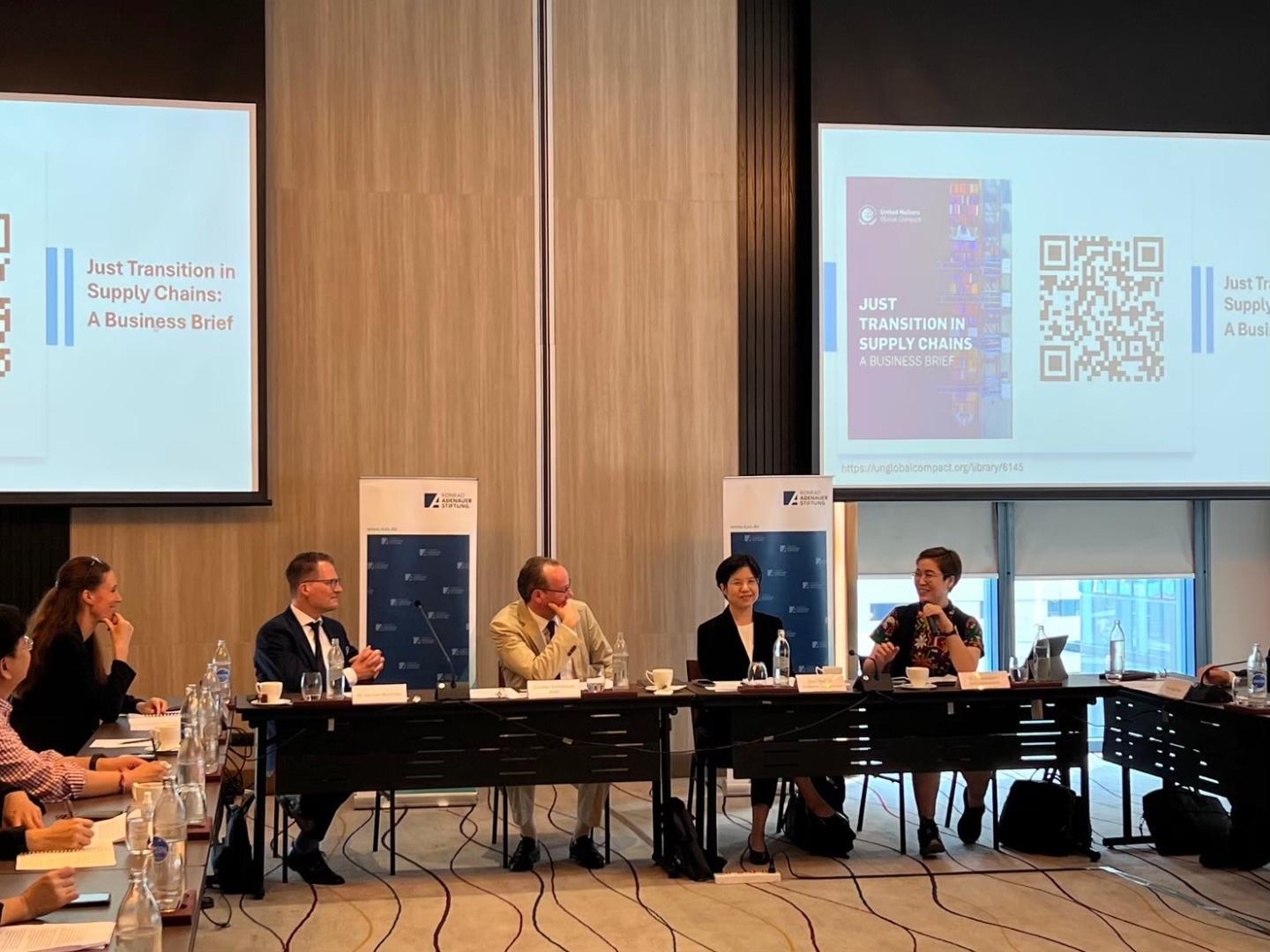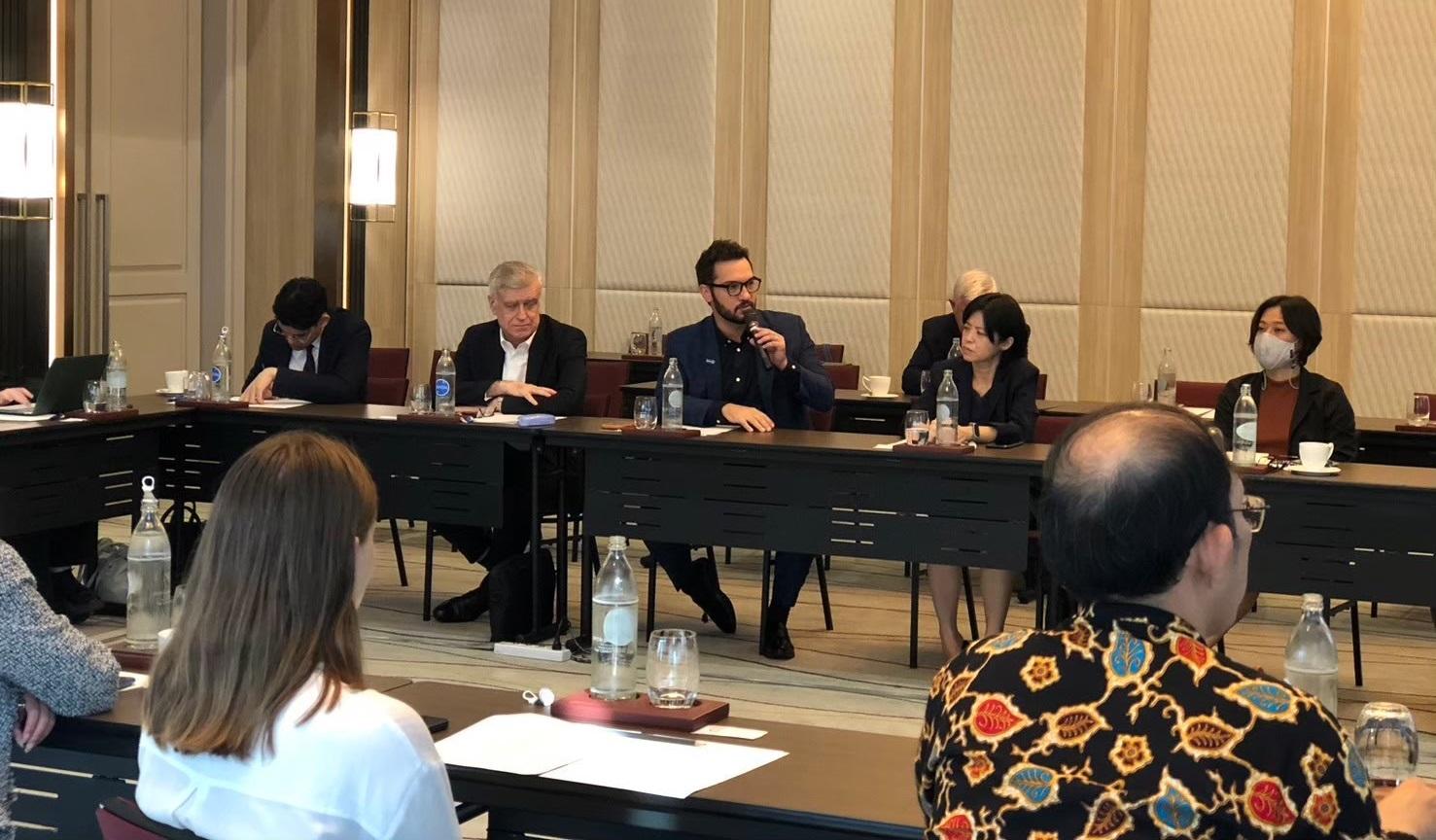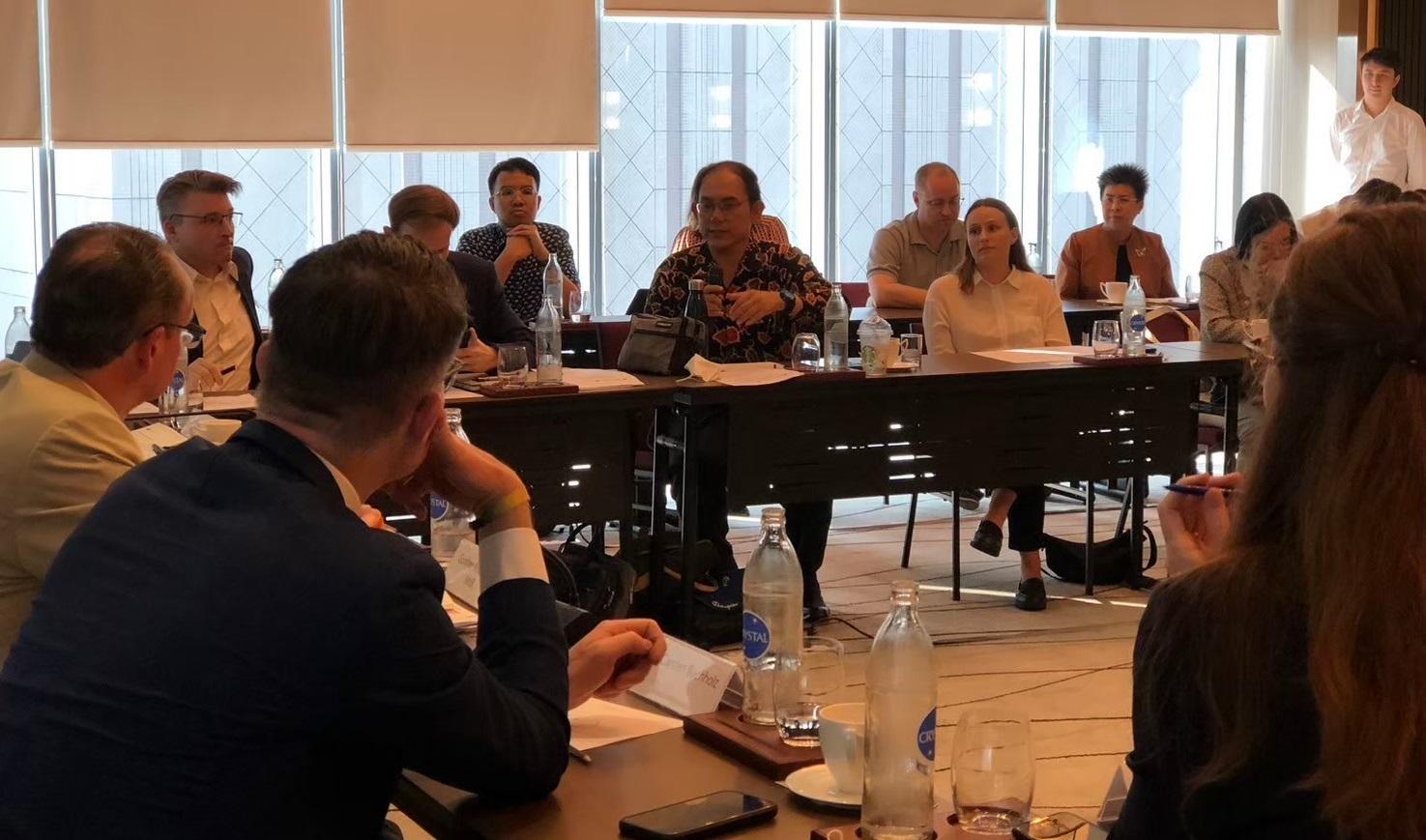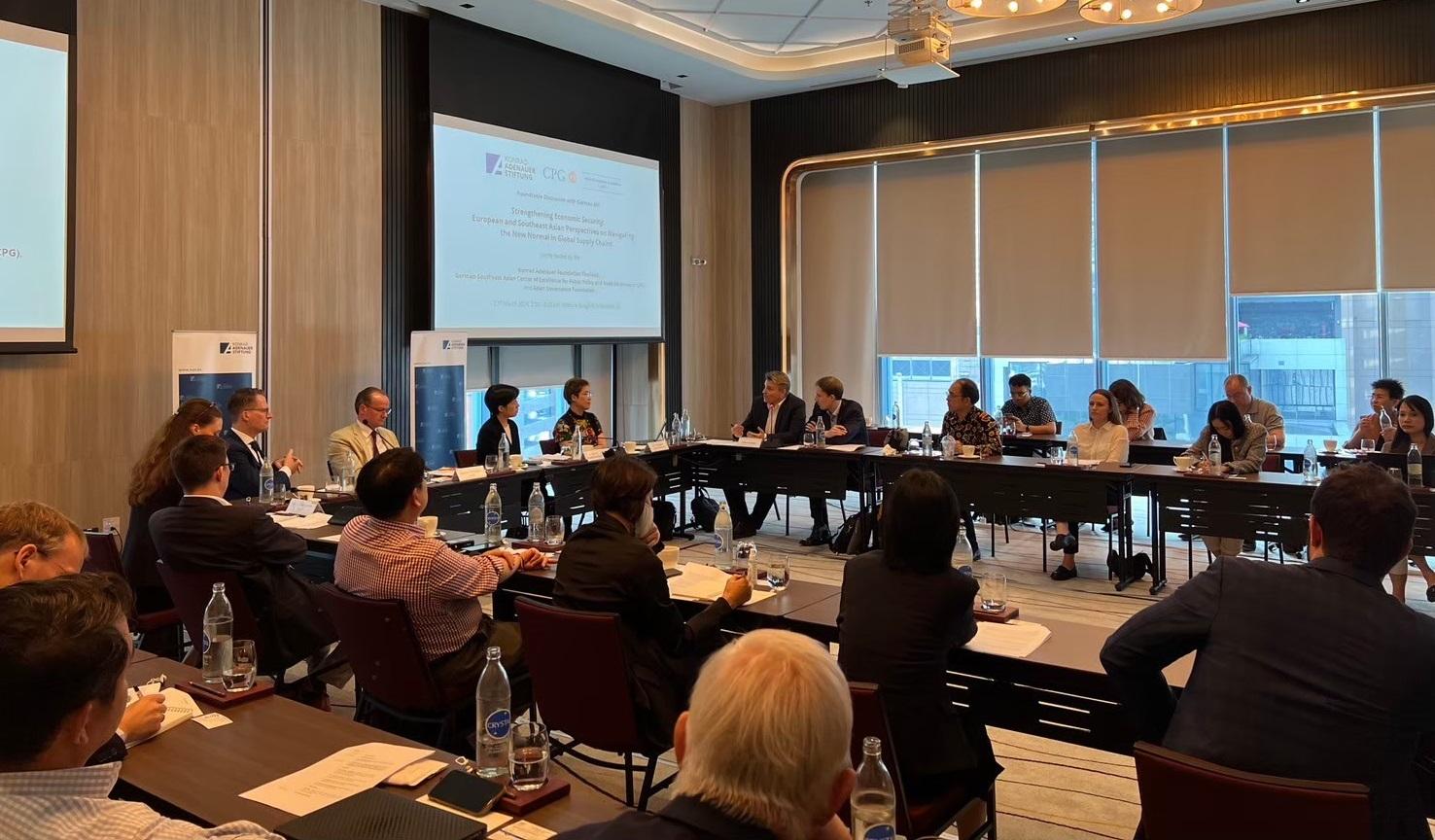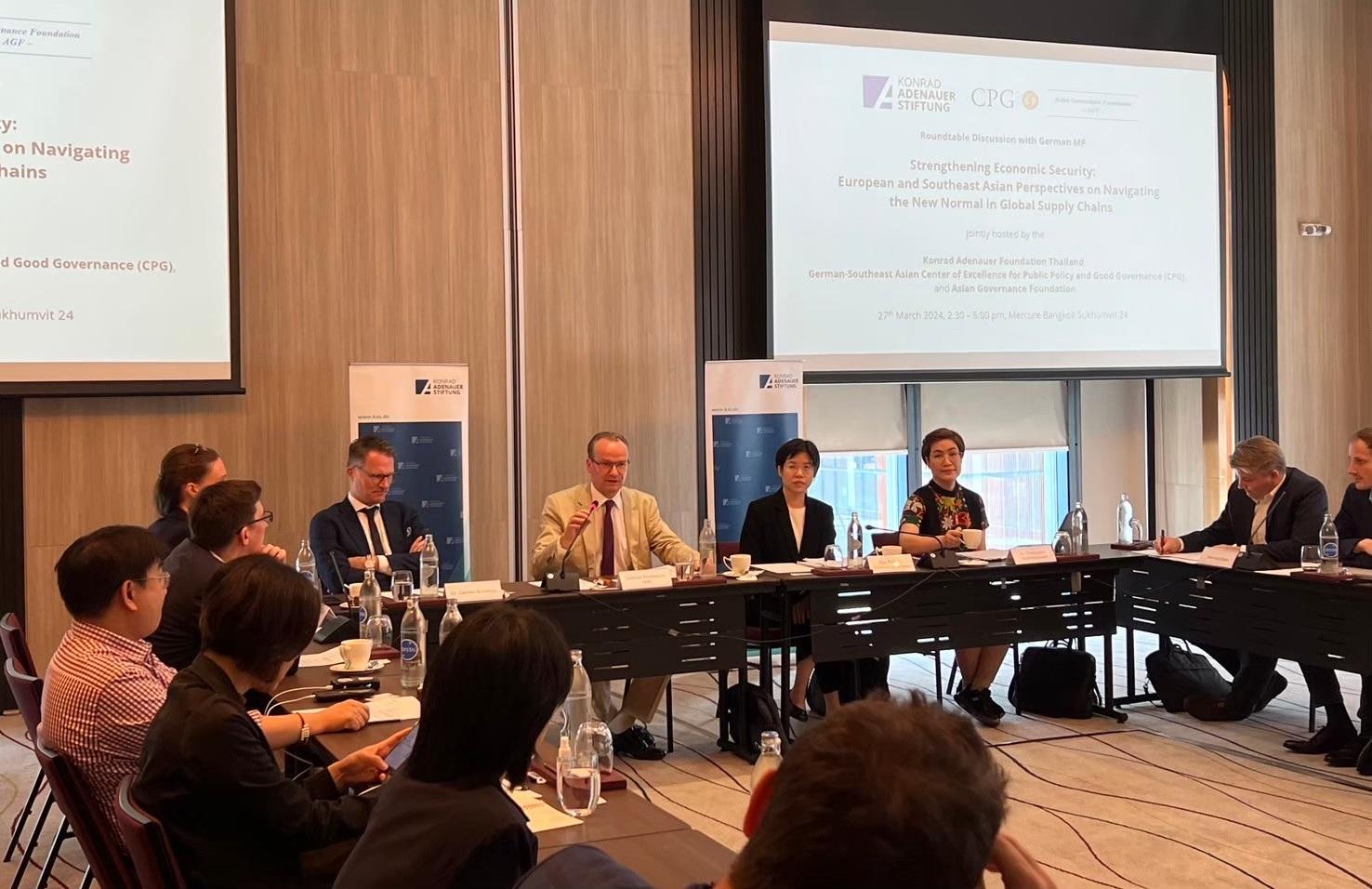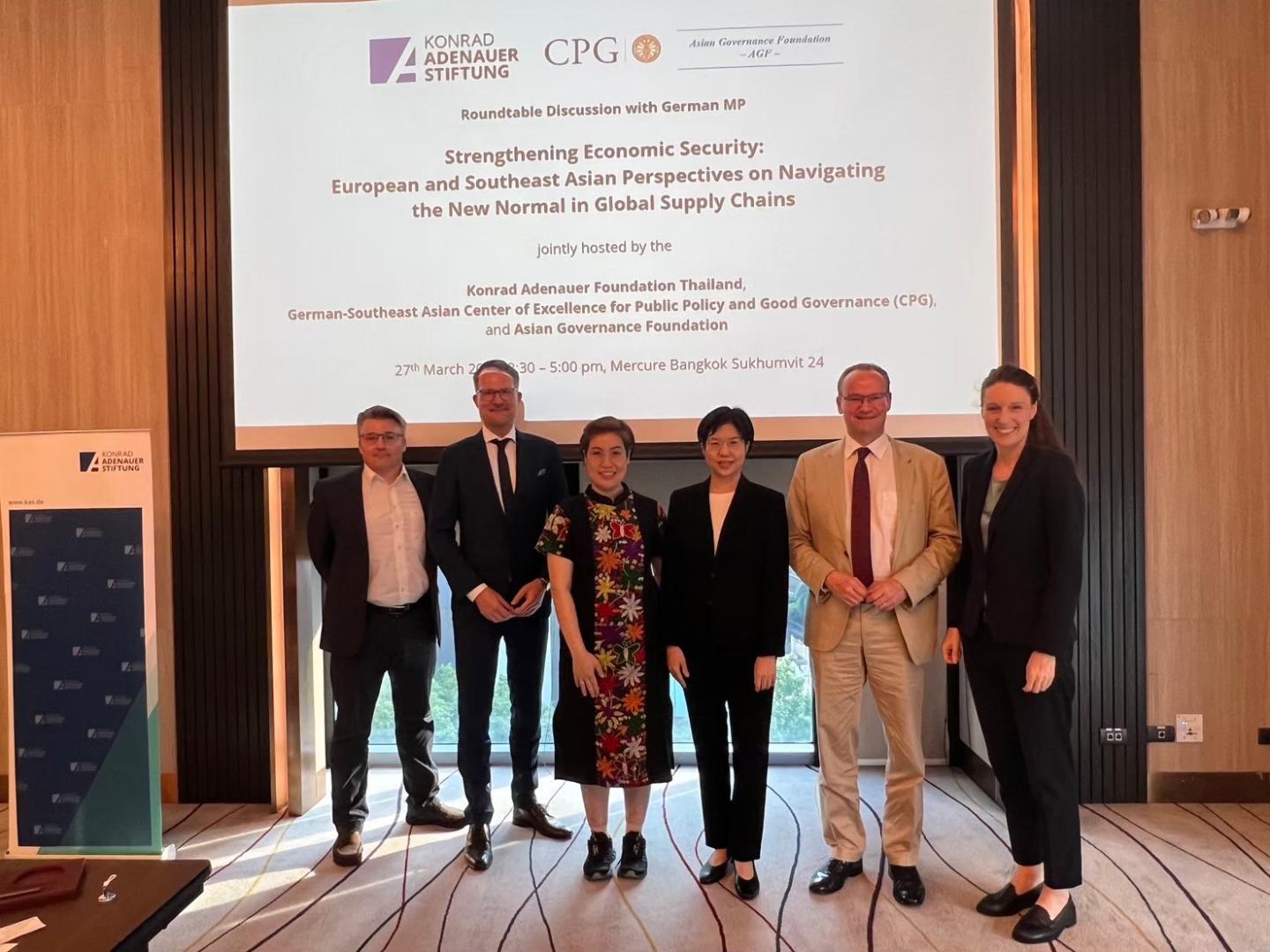The roundtable discussion featured insights from prominent speakers representing both Thai and German perspectives. The panelists included Mr. Gunther Krichbaum, Member of the German Bundestag and Spokesperson for European Policy of the CDU/CSU Parliamentary Group, Dr. Carsten Buchholz, Economist and Head of MP Krichbaum’s Office, Dr. Sineenat Sermcheep, Assistant Professor at the Faculty of Economics at Chulalongkorn University, and Dr. Thanyaporn Krichtitayawuth, Executive Director at the UN-Global Compact Network Thailand. The audience consisted of participants from diverse backgrounds, including international organizations, civil society, government agencies, and academia, as well as the business community. This indicates the broad appeal and relevance of the topic.
The discussion was opened by Mr. Henning Glaser, Director of the CPG and moderator of the event, who addressed the impact of less stable supply chains caused by various factors, such as the Covid-19 pandemic and the war in Ukraine. While acknowledging existing economic ties, he also stressed the importance of developing alternative connections and emphasized Europe's policy of 'derisking' from China.
When discussing the evolution of supply chains, particularly from a German perspective, MP Gunther Krichbaum emphasized the importance of a diversified approach. He also discussed the differing views on security in Thailand and Germany, which are shaped by their unique histories and circumstances. MP Krichbaum expressed concerns about economic security, especially considering the growing number of cyberattacks targeting businesses and economies. He reflected on the developing economic cooperation between Thailand, Europe, and other global players. While acknowledging the economic ties of Thailand with other countries, he highlighted the challenges posed by both China and Russia, particularly in the context of energy supply. Diversification is necessary to mitigate risks. For example, by diversifying trade through a free trade agreement (FTA) between Thailand and the EU, Germany could become more independent and gain security in times of crises.
From an additional German perspective, Dr. Carsten Buchholz discussed the economic impact of recent global events on supply chains. He underlined the importance of adapting to the changing nature of supply chains, particularly in light of issues such as COVID-19 and the conflict in Ukraine. He discussed the significance of social standards in supply chains and suggested that Thailand could attract more investment by aligning with European standards. Dr. Buchholz emphasized the importance of fair and careful management during this transition. He also highlighted the possibility of using FTAs as bridges for more diverse and free trade.
Asst. Prof. Dr. Sineenat Sermcheep provided insights into the development of global supply chains, particularly from a Thai perspective. She discussed both the positive and negative effects of ASEAN growth on supply chain management, highlighting the need for resilience in the face of challenges such as cyber threats. Asst. Prof. Dr. Sineenat highlighted the unprecedented impact of derisking and globalization on Thailand's economy. She also suggested that efficiency and cheap trade with China should no longer be the top priority. Instead, she emphasized the importance of transitioning to sustainable practices, such as green energy and the role of cybersecurity in safeguarding supply chains. Having never faced this before, Thailand looks to Europe for guidance on how to transform production in Thailand and to derisk from China through FTAs.
As for viewpoints from the private sector and civil society, Dr. Thanyaporn Krichtitayawuth shared insights on supply chain management, with a focus on Thailand's transition within the global market. She discussed the sectors that are at risk in the Asia-Pacific region and emphasized the importance of fair and careful management during the transition. She highlighted the need to move away from low-cost and mass production practices, as they not only harm the environment but also contribute to low wages and poverty in the country. Dr. Thanyaporn pointed out the importance of transparency and risk management in supply chains, specifically regardgin due diligence for human rights. To be transparent, Thailand would need a legal framework to raise more awareness among its society on certain issues. She also discussed the challenges of complying with environmental and social standards, while emphasizing the competitive advantage of ESG compliance.
Additional insights and questions raised
MP Krichbaum provided a comprehensive overview of recent efforts to strengthen ties between Germany and Thailand. He emphasized the challenges posed by the EU's value-based policies and underscored the need for strategic autonomy to navigate global dependencies effectively. He fruther highlighted the complexities surrounding FTAs within the EU framework and highlighted the importance of flexibility in negotiations as well as identified potential areas for cooperation between Germany and Thailand, particularly in enhancing agricultural exports and sectoral efficiency. MP Krichbaum further elaborated on the urgency of FTAs and negotiation timelines and on the European Parliament's scrutiny of Thailand's democratic progress. Concerns about German companies' perceptions of risks from the Far East, particularly China, were also raised. MP Krichbaum echoed these sentiments, emphasizing the need for equal access to Asian markets for European companies and addressing potential risks of knowledge transfer.
Dr. Thanyaporn and Asst. Prof. Dr. Sineenat provided valuable insights into opportunities and challenges for the local economy, emphasizing technology transfer, supply chain improvement, and the benefits of future collaborations as well as FTAs in boosting exports and economic resilience. From the German point of view, MP Krichbaum concluded with optimism regarding FTAs, acknowledging challenges but expressing confidence in their resolution and underscoring the importance of human rights development as observed by the EU.
The roundtable discussion concluded with a small networking refreshment, providing attendees with an opportunity to engage in dialogue and explore potential avenues for collaboration in economic security and diversifying supply chains.
Overall, the activity provided a highly valued platform for fostering a deeper understanding and collaboration on the complexities of global supply chains, particularly during current geopolitical tensions. The exchange of ideas indicated the need for proactive strategies in navigating evolving supply chain dynamics and the necessity for collaborative efforts in ensuring resilience and adaptability in the face of multifaceted pressures.
Report provided by Michelle Silies, KAS-Thailand Intern



